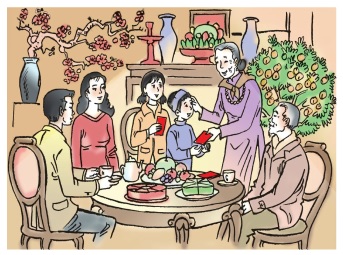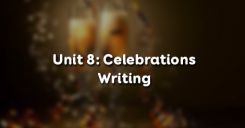Bài học Unit 8 Celebrations phần Reading hướng dẫn các em tìm hiểu về phong tục lễ tết của dân tộc Việt Nam. Qua đó cải thiện kỹ năng đọc hiểu của các em trở nên thông thạo trong việc đọc và nắm bắt ý chính và chi tiết của bài.
Tóm tắt bài
1. Before You Read Unit 8 Lớp 11
Work in pairs. Look at the picture and discuss the questions. (Làm việc theo cặp. Hãy nhìn hình và thảo luận các câu hỏi sau.)

- What time of the year is it? (Đây là thời điểm nào trong năm?)
- What are the people in the picture doing? (Những người trong hình đang làm gì?)
- What else do you see in the picture? (Bạn còn thấy gì khác trong hình?)
Guide to answer
- It is Lunar New Year.
- They exchange New Year's wishes, give and receive lucky money.
- I can see apricot flowers on the left and a kumquat tree on the right of the picture.
Work in pairs. Tell your partner which of these activities you enjoy doing most at Tet. Are there any other things you like doing? (Làm việc theo cặp. Kể cho bạn học nghe hoạt động nào sau đây bạn thích nhất trong dịp Tết. Bạn còn thích hoạt động nào khác nữa không?)
a) making banh chung: gói bánh chưng
b) decorating the house: trang trí nhà cửa
c) eating special Tet foods: ăn các món đặc biệt của ngày Tết
d) going to the flower market: đi chợ hoa
e) going to the pagoda: đi chùa
f) watching fireworks: xem bắn pháo hoa
g) receiving "lucky money": nhận tiền mừng tuổi
h) visiting relatives and friends: thăm họ hàng và bạn bè
Guide to answer
At Tet, I enjoy receiving "lucky money" most. Besides, I like going to the flower market and watching fireworks.
2. While You Read Unit 8 Lớp 11
Read the text about Tet in Vietnam, and then do the tasks that follow. (Đọc bài văn về Tết ở Việt Nam, và làm các bài tập theo sau.)
2.1. Unit 8 Reading Task 1
Find what the following words mean in the text. (Use a dictionary if necessary.) (Tìm nghĩa của các từ sau trong bài đọc. (Dùng từ điển khi cần thiết).)
1. grand: _________ 2. agrarian: __________
3. banner: ________ 4. pray: ___________
5. sugared apples: _______ 6. excitement: __________
Guide to answer
- grand: to lớn, hoành tráng
- agrarian: thuộc về nông nghiệp
- banner: băng rôn
- pray: cầu nguyện
- sugared apples: táo tẩm đường
- excitement: sự nhộn nhịp
2.2. Unit 8 Reading Task 2
Decide whether the statements are True (T) or False (F). (Xác định xem các câu sau là đúng (T) hay sai (F).)
- Tet is always on 20th February on the Western calendar.
- According to the text, for people anywhere in the world the beginning of spring is the start of a new year.
- Tet used to be longer than it is nowadays.
- According to the text, "lucky money" is given to everyone at Tet.
- Kumquat trees are popular both in the North and on the South of Vietnam.
- People try to be nice and polite to each other because they want to have luck on New Year's Day.
Guide to answer
| 1 | 2 | 3 | 4 | 5 | 6 |
| F | F | T | F | T | F |
Correct false sentences
1. It falls sometime between 19 January and 20 February on the Western calendar.
2. The beginning of spring is the start of a new year for agarian people.
4. Only children receive lucky money.
6. They want to have good luck during the whole year.
2.3. Unit 8 Reading Task 3
Answer the following questions. (Trả lời các câu hỏi sau.)
- When is Tet holiday in Vietnam? (Ngày Tết ở Việt Nam diễn ra khi nào?)
- How long did Tet preparations and celebrations last in the past? (Trước đây, những việc chuẩn bị và tổ chức Tết kéo dài bao lâu?)
- What do streets look like before Tet? (Đường phố trông như thế nào trước ngày Tết?)
- What do people often do to prepare for Tet? (Người ta thường làm gì để chuẩn bị Tết?)
- What is banh chung made from? (Bánh chưng được làm từ nguyên liệu gì?)
- What is mut? (Mứt là gì?)
- What are some popular activities at Tet? (Một số hoạt động phổ biến trong ngày Tết là gì?)
Guide to answer
- It's sometime between 19 January and 20 February on the Western calendar.
- They lasted for months.
- Streets are decorated with colored lights and banners.
- They buy gifts, clean and decorate their houses and cook traditional foods.
- It is made from sticky rice.
- It is candied fruit.
- Visiting friends and other family members, exchanging wishes, going to the pagoda, playing games, ...
3. After You Read Unit 8 Lớp 11
Tell each other about your last Tet holiday, focusing on the following main points. (Làm việc nhóm. Kể cho nhau nghe về ngày Tết năm trước của bạn, tập trung các điểm chính sau đây.)
- how you prepared for Tet (bạn chuẩn bị Tết như thế nào)
- how you decorated your house (bạn trang trí nhà cửa thế nào)
- who you visited (bạn đi thăm ai)
- what special foods you ate (những món ăn đặc biệt mà bạn ăn)
- what activities you enjoyed doing most during Tet (những hoạt động bạn đã tham gia vui chơi trong Tết)
Guide to answer
Last Tet holiday we did a lot of things. We went market to buy food, flowers, ... . We helped our parents with wrapping banh chung and cooking frozen meat. On the first day of Tet, we went to visit our grandparents and relatives, and we went to pagoda to pray for our family a happy year. During Tet days, we ate traditional foods such as banh chung, salted onions, ... . We enjoyed the gathering of the family dinner on the New Year's Eve and meals on Tet days because it's the opportunity that ties our family relationship and makes us closer and closer. We also enjoyed playing some traditional games such as playing chess, playing on the swings, ... . We should remain Tet and preserve it.
4. Phần dịch Reading Unit 8 lớp 11
Tết Nguyên Đán, hay Tết, là ngày nghỉ chính của Việt Nam. Đó là dịp trọng đại nhất trong năm rơi vào khoảng giữa 19 tháng 1 và 20 tháng 2 dương lịch. Tết đánh dấu sự bắt đầu của mùa xuân, và đối với nhà nông là sự khởi đầu một năm mới.
Việc chuẩn bị và tổ chức Tết trước đây đã từng kéo dài hàng tháng nhưng ngày nay ngày nghỉ ngắn hơn nhiều. Tuy nhiên, cũng có sự nhộn nhịp trước khi Tết. Đường phố được trang trí đèn màu và các băng rôn đỏ. Các cửa hàng thì đầy ắp hàng hóa. Mọi người bận rộn mua quà, quét dọn, trang trí nhà cửa và nấu các món ăn truyền thống.
Vào dịp này, người ta thường trang trí nhà cửa với các loại cây và hoa. Các loại hoa truyền thống trong ngày Tết là hoa đào ở miền Bắc và hoa mai ở miền Nam. Ngoài ra, cây quất mang trái chín có màu vàng cam sậm cũng rất phổ biến trên khắp cả nước. Một trong những thức ăn đặc biệt nhất của ngày Tết là bánh chưng, loại bánh được làm từ nếp, một loại đậu xanh có hạt vàng và thịt lợn mỡ. Mứt là loại trái cây tẩm đường như táo, mận, và ngay cả cà chua tẩm đường cũng rất được ưa chuộng.
Vào những đầu Tết, mọi người cố gắng tử tế và lịch sự với những người khác. Người ta tin rằng những điều mà họ làm vào ngày đầu tiên trong năm sẽ ảnh hưởng đến vận may rủi của họ trong suốt cả năm. Người ta chỉ dành những lời lẽ tốt đẹp cho nhau. Mọi người thăm hỏi các thành viên khác trong gia đình hoặc bạn bè và chúc nhau lời chúc năm mới. Trẻ em nhận tiền mừng tuổi đựng trong bao màu đỏ. Nhiều người đi chùa để cầu phúc cho mình và cho gia đình mình. Tết thật sự là thời gian vui chơi và lễ hội trên khắp cả nước.
Bài tập minh họa
Read the passage carefully then choose the correct answers.
In Viet Nam, there is great excitement built up well before Tet Nguyen Dan. First, every family organizes a trip to the cemetery to visit the graves of their ancestor. After that, to create an air of prosperity, wealth and fun for the first three days of the Lunar New Year, people are kept busy cooking traditional foods, buying gifts, and making other preparations. Certain items deemed to be bought or made are banh chung, dried watermelon seeds, tea, dried sausages, fruit (fresh and candied), ornamental plants and flowers. Red and yellow flowers are ideal as they make the house more welcoming. On the New Year's days, only good comments and wishes can be expressed. Children receive their Ii xi (or red envelopes with lucky money inside). People make a visit to family members, neighbors, and close friends. And people who live apart from their family try to get together on these days. Clearly enough, games and various forms of entertainment are staged and these often last a week. Varying traditional specialties including wrestling, buffalo fighting, dragon or unicorn dancing take place in different regions.
1. Before Tet, people usually _________.
a. are very busy with the preparations
b. have great excitement and fun
c. rebuild their ancestral graves
d. spend time on traveling
2. Which of the following, according to the passage, is not usually eaten during Tet?
a. candied ginger b. sausages c. watermelon d. beef stew
3. Why are red and yellow flowers popular in decorating the house at Tet?
a. Because they are friendly and pleasant.
b. Because they make the house look comfortable to be in.
c. Because they represent good luck.
d. Because they are attractive and cheap.
4. On the New Year's days, _________.
a. people are busy cooking traditional foods
b. everybody receives their 'lucky money'
c. only good comments can be made
d. houses are cleaned and decorated with trees and flowers
5. Which of the following is not mentioned in the passage?
a. Tet is period of concord and hope.
b. Tet is a sort of bond that ties the living and the' dead.
c. Tet is a great season of joy and of entertainment.
d. Tet is an occasion for a family reunion.
Key
| 1 | 2 | 3 | 4 | 5 |
| a | d | b | c | a |
Bài tập trắc nghiệm Reading Unit 8 Lớp 11
Trên đây là nội dung bài học Reading Unit 8 Lớp 11 - Celebration, để củng cố và nâng cao kỹ năng đọc mời các em tham gia thực hành Trắc nghiệm Unit 8 lớp 11 Reading
-
Câu 1:
(1) __________
- A. earliest
- B. latest
- C. previous
- D. old
-
Câu 2:
(2) __________
- A. which
- B. when
- C. because
- D. by then
-
Câu 3:
(3) __________
- A. single
- B. one
- C. only
- D. lonely
Câu 4-10: Mời các em đăng nhập xem tiếp nội dung và thi thử Online để củng cố kiến thức về bài học này nhé!
Hỏi đáp Reading Unit 8 Lớp 11
Trong quá trình học bài và thực hành trắc nghiệm có điểm nào chưa hiểu các em có thể đặt câu hỏi trong mục Hỏi đáp để được sự hỗ trợ từ cộng đồng HỌC247. Chúc các em học tốt!
-- Mod Tiếng Anh 11 HỌC247










